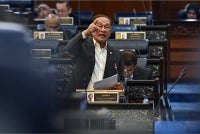Oil prices could soar to $100 per barrel due to Middle East escalation - Expert
US involvement key to Malaysia's economic risk in Middle East escalation
MOHD FAIZUL HAIKA MAT KHAZI
SHAH ALAM - The recent escalation in the Middle East, including Iran's retaliation against Israel and Israel's genocide in Gaza, could push global oil prices back to US$100 per barrel, according to an analyst.
Universiti Putra Malaysia MBA Director Associate Professor Dr Ahmed Razman Abd Latiff said this isn't unrealistic considering current global oil prices hovering around US$90.
However, he downplayed the potential impact on the Malaysian economy due to limited trade with the involved countries.
"While oil prices might rise, the impact on Malaysia is likely minimal.
"Israel has no diplomatic or trade ties with Malaysia, and Iran's business dealings with us are specific.
"Our main trading partners are China and the US.
"Malaysia would see significant economic repercussions if the US gets directly involved in the escalation," he told Sinar when contacted.
Razman's comments addressed concerns about rising oil prices and their effect on Malaysian consumers, particularly low-income groups (B40).
He highlighted that Iran justified its retaliation under Article 51 of the UN Charter, claiming self-defence after Israel's attack on its consulate in Damascus.
In a related matter, Razman also acknowledged that higher global oil prices could benefit Petronas due to Malaysia's significant petroleum exports.
However, he assured Malaysians that government-controlled subsidies on RON95 petrol and diesel will shield them from global price fluctuations.
"Malaysians are not affected by the increase in oil prices in the global market, as we can still enjoy subsidised RON95 petrol and diesel at prices controlled by the Federal Government," he said.
Download Sinar Daily application.Click Here!














